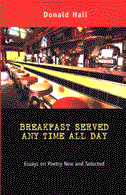| |
|
 |
Breakfast Any Time All Day
Essays by Donald Hall
University of Michigan Press, $17.95
Reviewed by: Steve Schroeder
Book rating: 7 of 10 stars
|

Donald Hall is among the foremost "mainstream" poets in America, judging by his record-tying 12 appearances in the Best American Poetry series (only John Ashbery has as many appearances), Guggenheim Fellowships, Lenore Marshall Award, Ruth Lilly Prize, and so on. He is also a prolific author of essays and other prose, explaining the appearance of Breakfast Served Anytime All Day: Essays on Poetry New and Selected, which collects and updates 25 of his works.
In these essays, Hall is at his best when plainspoken and direct. He is at his worst when apparent attempts to be poetic go over the top and become insubstantial, convoluted, and pointlessly metaphysical. Sometimes this happens within the space of a paragraph, as in "The Expression without the Song," one of the early essays in the book.
Arguing against didacticism without beauty in poetry, Hall says "If poetry were judged by what usually passes for content, the best of it would be eighth-rate philosophy, on the intellectual level of textbooks and the Reader's Digest. " Pithy, biting, and accurate.
But just one paragraph later, belaboring the point, he writes "Poetry happens in the mouth, and the mouth opens up the imagination, the way into the dream country of wishes and fears." Setting aside that he's chosen a very highfalutin way to state that poetry is about sound, is the mouth really the sole gateway to imagination, wishes, and fears? Reading the passage makes me want to jab a stick in there and find out.
Big picture, two of Hall's more prominent recurring concepts embody this duality in his work very well. The first is probably his most famous critical concept: the "McPoem." McPoems, the prevalent product of contemporary American poetry, are drained of all their life to please the lowest common denominator in a workshop, be it Iowa or the local writing group. Hall is dead-on using his one-word epithet to capture the mass-produced, bland, and unhealthy nature of the McPoem. Many poets and readers have heard and used the phrase, and most would recognize examples of what they consider McPoems upon learning the definition. This creation is superb.
Hall's less auspicious theory is "Goatfoot, Milktongue, Twinbird," which Hall seemingly liked so much that he named an entire book of essays after it, and which appears in several of the essays here. This essay is about the oral, physical, and sensual pleasures of poetry (a topic Hall covers better elsewhere in the book), but problems beset it like German fairy tale wolves.
The most immediately obvious problem is the writing style of the piece, which features the characters of Goatfoot, Milktongue, and Twinbird capering in a hopelessly twee, new-age manner. Another issue is that the names themselves are easily confused, so that I literally had to look them up repeatedly to make sure they weren't actually Goatbird and Milkfoot or something else. The final, deepest misstep is the complexity of the theory making it seem that Hall is fabricating new aspects to fit whatever he wants: it turns out to include not only the title characters but a Priestess and a Maker, all of them representing vague aspects of poetry and its pleasures that could surely be addressed in much clearer and more interesting ways.
It should be noted for the sake of fairness, however, that even in the middle of the Goatfoot debacle, Hall manages to write this gem about practice and craft: "When you learn something so well that you forget it, you can begin to do it."
In the essays that follow, Hall settles down to some excellent work. "Robert Frost Corrupted" uses Edward Lathem's mangling of Frost's commas as the starting point for a more general discussion of punctuation in poetry, an under-discussed topic. "James Wright: Lament for a Maker" combines a touching personal tribute and interesting critical commentary. And "Size and Scale" considers the literal and figurative magnitude of poetry based on ideas of the sculptor Henry Moore.
If you're willing to overlook the awkward spots, Breakfast Served Anytime All Day offers insightful essays and some truly sharp wit. (In a piece on imagery, he writes of surrealism, "It is always the umbrella and the sewing machine, even when the umbrella wears shark's teeth and the sewing machine has goat's ankles.") The book is definitely worth the time and effort. In fact, it may indicate that Hall's most important contributions to poetry have been through his critical prose rather than through his mainstream-certified verse.
Author's Biography:
| |
Donald Hall, the founding editor of the Poets on Poetry series from the University of Michigan Press, is the recipient of numerous accolades, including a National Book Critics Circle Award and two Guggenheim fellowships. He lives in New Hampshire.
|
|
|
 |
 |




